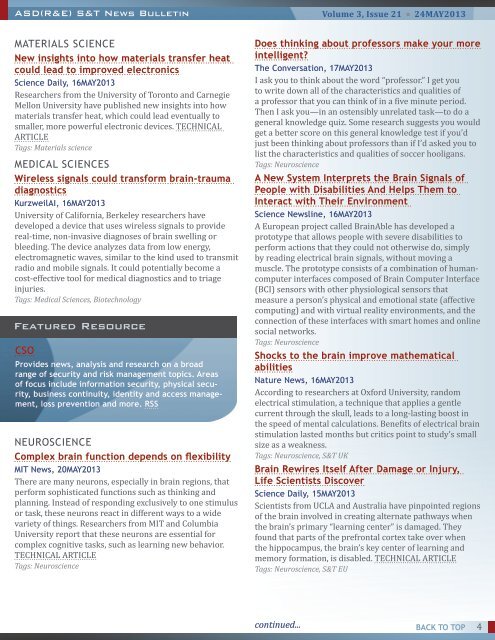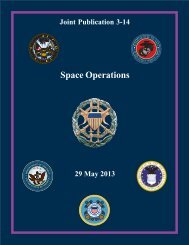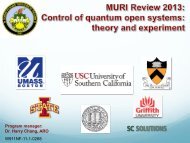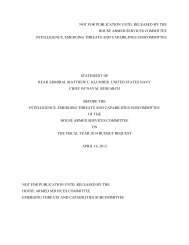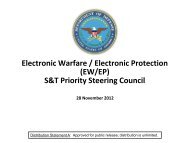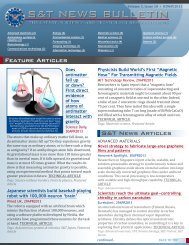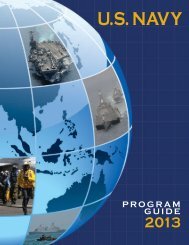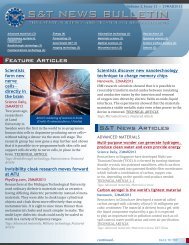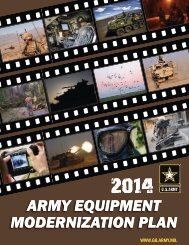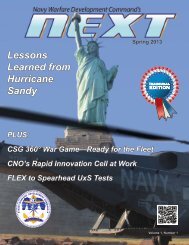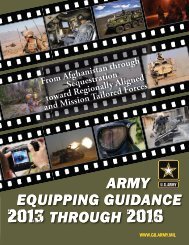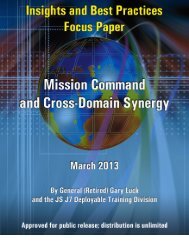Feature Articles S&T News Articles - Defense Innovation Marketplace
Feature Articles S&T News Articles - Defense Innovation Marketplace
Feature Articles S&T News Articles - Defense Innovation Marketplace
Create successful ePaper yourself
Turn your PDF publications into a flip-book with our unique Google optimized e-Paper software.
ASD(R&E) S&T <strong>News</strong> BulletinVolume 3, Issue 21 ■ 24MAY2013MATERIALS SCIENCENew insights into how materials transfer heatcould lead to improved electronicsScience Daily, 16MAY2013Researchers from the University of Toronto and CarnegieMellon University have published new insights into howmaterials transfer heat, which could lead eventually tosmaller, more powerful electronic devices. TECHNICALARTICLETags: Materials scienceMEDICAL SCIENCESWireless signals could transform brain-traumadiagnosticsKurzweilAI, 16MAY2013University of California, Berkeley researchers havedeveloped a device that uses wireless signals to providereal-time, non-invasive diagnoses of brain swelling orbleeding. The device analyzes data from low energy,electromagnetic waves, similar to the kind used to transmitradio and mobile signals. It could potentially become acost-effective tool for medical diagnostics and to triageinjuries.Tags: Medical Sciences, Biotechnology<strong>Feature</strong>d ResourceCSOProvides news, analysis and research on a broadrange of security and risk management topics. Areasof focus include information security, physical security,business continuity, identity and access management,loss prevention and more. RSSNEUROSCIENCEComplex brain function depends on flexibilityMIT <strong>News</strong>, 20MAY2013There are many neurons, especially in brain regions, thatperform sophisticated functions such as thinking andplanning. Instead of responding exclusively to one stimulusor task, these neurons react in different ways to a widevariety of things. Researchers from MIT and ColumbiaUniversity report that these neurons are essential forcomplex cognitive tasks, such as learning new behavior.TECHNICAL ARTICLETags: NeuroscienceDoes thinking about professors make your moreintelligent?The Conversation, 17MAY2013I ask you to think about the word “professor.” I get youto write down all of the characteristics and qualities ofa professor that you can think of in a five minute period.Then I ask you—in an ostensibly unrelated task—to do ageneral knowledge quiz. Some research suggests you wouldget a better score on this general knowledge test if you’djust been thinking about professors than if I’d asked you tolist the characteristics and qualities of soccer hooligans.Tags: NeuroscienceA New System Interprets the Brain Signals ofPeople with Disabilities And Helps Them toInteract with Their EnvironmentScience <strong>News</strong>line, 16MAY2013A European project called BrainAble has developed aprototype that allows people with severe disabilities toperform actions that they could not otherwise do, simplyby reading electrical brain signals, without moving amuscle. The prototype consists of a combination of humancomputerinterfaces composed of Brain Computer Interface(BCI) sensors with other physiological sensors thatmeasure a person’s physical and emotional state (affectivecomputing) and with virtual reality environments, and theconnection of these interfaces with smart homes and onlinesocial networks.Tags: NeuroscienceShocks to the brain improve mathematicalabilitiesNature <strong>News</strong>, 16MAY2013According to researchers at Oxford University, randomelectrical stimulation, a technique that applies a gentlecurrent through the skull, leads to a long-lasting boost inthe speed of mental calculations. Benefits of electrical brainstimulation lasted months but critics point to study’s smallsize as a weakness.Tags: Neuroscience, S&T UKBrain Rewires Itself After Damage or Injury,Life Scientists DiscoverScience Daily, 15MAY2013Scientists from UCLA and Australia have pinpointed regionsof the brain involved in creating alternate pathways whenthe brain’s primary “learning center” is damaged. Theyfound that parts of the prefrontal cortex take over whenthe hippocampus, the brain’s key center of learning andmemory formation, is disabled. TECHNICAL ARTICLETags: Neuroscience, S&T EUcontinued...BACK TO TOP4


